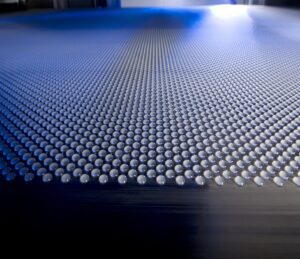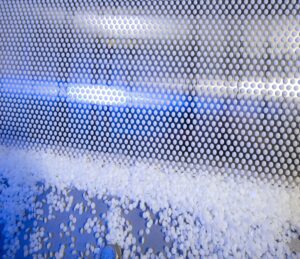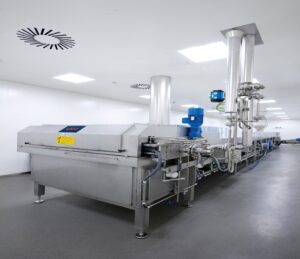Depending on which source you choose to believe, the beauty and personal care market is estimated to be worth anything from $300-$500 billion a year, with some predicting it will reach $800 billion by 2025 – about the same as the GDP of Switzerland. Whatever the actual figure, that’s a lot of make-up, perfume, toiletries, deodorants and haircare/skincare products.
While we’re all intimately familiar with the end products, the production of cosmetics involves the use of a wide range of base materials and chemical additives. Lanolin for instance – a wax obtained from sheep’s wool – is used in eye liner, lipstick, face powder and anti-aging products. Bees wax is another widely used natural product, its anti-inflammatory and moisturizing properties making it ideal for hand lotions, hair products and lip balm. Other commonly used materials include fatty alcohols, waxes, organic compounds (e.g. L-menthol for toothpaste), pigments, resins and surfactants.
As these all eventually come into contact with the human body in some way or another, they have to be processed in a manner that conforms with the high standards of quality and hygiene.
These standards have been formalised by regulatory agencies including the US Food and Drug Administration (FDA), World Health Organization (WHO), EU and national bodies on every continent in the form of Good Manufacturing Practice (or Current Good Manufacturing Practice) regulations, the primary objectives of which include the prevention of harm to the end user and ensuring that the product is free from contamination.
This places specific responsibilities on processors of base materials and ingredient products that will ultimately be used by the cosmetic industry, among which is that all systems must be designed in such a way as to ensure clean and hygienic manufacturing.

Processing based on 40+ years’ experience
IPCO has been supplying pastillation systems to the wider chemical industry since the late 1970s and has adapted its core technologies to meet that needs of food and pharmaceutical processing. This broad experience has led to the development of end-to-end solidification solutions in full compliance with GMP guidelines.
The foundation of IPCO’s GMP-compliant solidification system is its Rotoform process, used to convert chemical melts into pastille form in a single step, delivering an end product of consistent shape and size.
The product is delivered to the system in melt form. The Rotoform itself consists of a heated cylindrical stator and a perforated rotating shell that turns concentrically around the stator. Precisely metered drops of the product are deposited across the whole operating width of a continuously running stainless steel cooling belt.
A system of baffles and internal nozzles built into the stator provides uniform pressure across the whole belt width, providing an even flow through all holes of the perforated rotary shell. This ensures that all pastilles are of uniform size, from one edge of the belt to the other.
The rotational speed of the Rotoform is synchronized with the belt to allow a gentle deposition of the liquid droplets onto the moving belt without deformation. Heat released during cooling and solidification is transferred via the steel belt to cooling water sprayed underneath.
This water is collected in tanks and returned to the water recooling system; at no stage does it come into contact with the product.
The Rotoform process converts the melt into solid pastilles of a defined and consistent size, a form that is free flowing and ideal for handling, storage and blending, a key requirement of base materials used by the cosmetics industry.

System enhancements for GMP-compliance
The Rotoform process is already inherently clean and hygienic. There is no risk of cross contamination between product and cooling media; easy access to all key areas simplifies maintenance and cleaning; and most major components (e.g. drum, cooling water piping etc.) are stainless steel by default.
However, supplying a GMP-compliant process requires additional properties and technical features, and IPCO has the know-how to design these into Rotoform lines that will be used in the processing of materials for cosmetics.
These include the use of all stainless steel framework and piping, and GMP-compliant lubricants. As the product is cooled and solidified directly on the steel belt, this is an area that requires particular attention. Instead of using a rubber V-rope, the belt is left ‘naked’ and guided by a separate belt tracking system. The steel grade is IPCO 1150 SM, a high strength, low carbon, martensitic stainless steel characterised by its good mechanical properties, good resistance to corrosion and exceptional flatness (very important as no V-rope is used).
Other features can include an enclosed belt washing box with hot water or steam spraying nozzles and subsequent jet air for drying; electric light in the product feed area; video recording in the pastilles discharge area; an oscillating discharge knife ensuring a clean belt; and drum heating to generate a temperature profile for smooth cooling.

Full Rotoform family
Rotoform technology has evolved over the years to meet the process requirements of a wide range of products and its modular design has led to the development of an entire family of systems.
The Rotoform family is capable of solidifying low and high viscous melts (up to 40 000 mPas) at temperatures up to 300 °C. The range includes systems for the production of micropastilles down to 0.8 mm diameter, and solutions for small batch processing of between 10-20 kg/hr (important for the cosmetics industry which often uses expensive materials in relatively small quantities), all the way to models capable of handling 100-300 kg/hr.